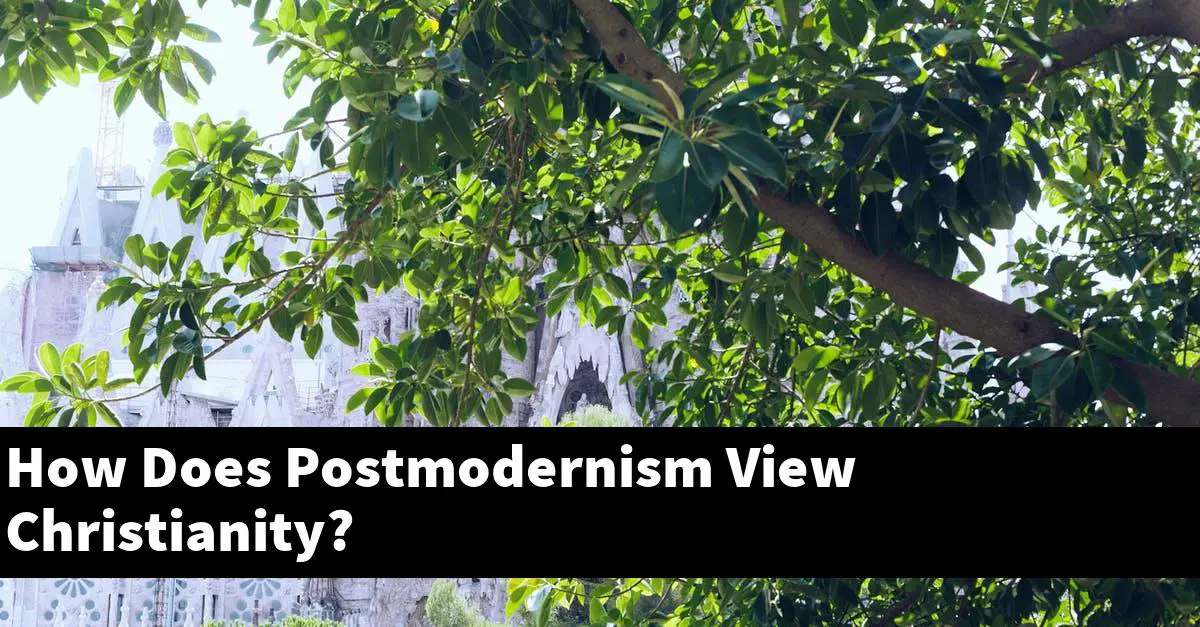Postmodernism is a philosophical and artistic movement that began in the mid-20th century. It is characterized by a rejection of traditional values and beliefs, and a focus on individual experience and interpretation.
Christians have traditionally been seen as a major force in the development of Western civilization. However, postmodernism views Christianity as just another cultural construct, and questions its claims to truth and authority.
Many postmodern thinkers believe that Christianity is an oppressive force that has been used to control and suppress people.
What does postmodernism mean in Christianity?
Postmodernism is a philosophical and cultural movement that emerged in the late 20th century. It challenges traditional assumptions about knowledge, truth, and reality.
Postmodern thinkers argue that these assumptions are not universal and can be questioned. They also argue that cultures and institutions have created systems of meaning that are not universally true.
As a result, postmodern thinkers argue that there is no single truth and that different perspectives should be considered.
Postmodern Christians argue that there is no single truth and that different perspectives should be considered. They also argue that culture and institutions have created systems of meaning that are not universally true.
As a result, postmodern Christians argue that Christianity should be open to change and should not be based on blind faith.
What does postmodernism say about religion?
Postmodernism challenges the idea that there is a universal truth or meaning to be found in religion. Instead, it celebrates the multiplicity of religious perspectives and practices.
This means that there is no one right way to believe or practice religion, and that different people can find meaning in different religious traditions.
Postmodernists also believe that religion is often used to justify oppressive social structures and practices. For example, many religions support the idea of a hierarchical society where people are ranked based on their status in society.
This can lead to discrimination and violence against those who are not considered to be part of the ‘right’ group.
Overall, postmodernists believe that religion is a source of confusion and conflict, rather than understanding and peace.
Are postmodernists religious?
It is highly personal. Some people who identify as postmodernists may believe in a God or gods, while others may not.
Some may believe in a pantheon of gods or goddesses, while others may not believe in any sort of deity. Additionally, some people who identify as postmodernists may see religion as a tool used by privileged groups to maintain power, while others may see religion as a source of comfort and support.
Ultimately, it is up to the individual to decide whether or not they are religious.
What are the beliefs of postmodernism?
Postmodernism is a philosophical and cultural movement that emerged in the late 1960s and 1970s in reaction to modernism, which is the dominant philosophical and cultural movement of the time. Postmodernists believe that the traditional distinctions between objective reality and subjective experience are no longer valid, and that there is no single, objective truth.
Instead, they believe that all knowledge is perspectival, and that there is no way to objectively determine which perspectives are valid.
Postmodernists also believe that the modernist quest for certainty and objective truth led to the domination of the Western world by a single, universal perspective. They argue that this perspective is based on a false understanding of the nature of reality, and that it is therefore harmful to society.
Postmodernists believe that the only way to overcome this domination is to accept and embrace the plurality of perspectives that exist in society, and to reject the quest for certainty and objective truth.
What does postmodernism say about God?
Postmodernism rejects the idea that there is a single, divine reality that exists outside of and above the world. Instead, the postmodernist believes that reality is constructed and exists in a constantly changing and evolving manner.
This means that there is no objective reality that can be known or experienced by humans, and that any knowledge or understanding of the divine is subjective and based on individual experiences and perspectives.
Postmodernists also believe that there is no universal truth or morality that can be derived from the experience of the divine. Instead, postmodernists believe that morality and ethics are based on the individual experiences and perspectives of the individuals who create them.
Therefore, there is no single, objective way to understand or experience the divine, and any attempt to do so is ultimately based on human beliefs and assumptions.
What do postmodernists have to say about the Abrahamic faiths?
Postmodernists reject the idea that there is a single truth or interpretation of the world that is universally true. Instead, they believe that different cultures and individuals have their own interpretations of the world, and that there is no one correct way of understanding the world.
Postmodernists also believe that the Abrahamic faiths – Judaism, Christianity, and Islam – are based on flawed assumptions and are not realistic or accurate. They argue that these faiths are based on the idea that there is one God who created the world and who is responsible for all of the good and bad in it.
Postmodernists believe that this idea is not realistic or accurate, and that it is based on the idea that humans are completely separate from and superior to nature.
Finally, postmodernists argue that the Abrahamic faiths are based on the idea that humans are responsible for creating their own destiny. They believe that this idea is not realistic or accurate, and that it is based on the idea that humans are able to control their own lives and destiny.
Why is postmodernism wrong?
Postmodernism is wrong because it rejects objective reality and instead favours a subjective interpretation of the world. This subjective interpretation is based on the idea that there is no universal truth, and that all knowledge is subjective.
This means that postmodernism is unable to provide a clear understanding of the world, and is instead based on vague assumptions and assumptions that are constantly changing.
What is modernist perspective in religion?
Modernist perspective is a theological perspective which argues that religion should be based on reason and not on tradition. This perspective is also known as the “new theology.”
Modernist perspective is mainly found in Protestant churches.
Why is postmodernism controversial?
Postmodernism is controversial because it challenges the modernist assumptions that underpin much of the academic and professional world. Modernism is the dominant philosophical and cultural movement of the 20th century, and its assumptions – that progress is inevitable, that science and reason are the best methods for understanding the world, that universal truths exist – are widely accepted.
Postmodernism challenges these assumptions, arguing that they are based on a limited understanding of the world and that they are no longer valid.
Postmodernism also challenges the idea of objective truth. Modernism assumes that there is an objective reality that can be understood by anyone, regardless of their cultural background.
Postmodernism, however, argues that there is no such thing as an objective reality – all knowledge is based on the perspective of the individual observer. This means that there is no one correct interpretation of the world, and no single perspective that is superior to others.
Postmodernism has been controversial because it has been seen as a threat to the legitimacy of academic and professional institutions. Postmodernists argue that these institutions are based on a false understanding of the world, and that they are no longer capable of providing the accurate information that is needed to make sound decisions.
They also argue that these institutions are biased, and that they promote the interests of the dominant groups in society rather than the interests of the majority of people.
Postmodernism has also been controversial because it has been seen as a threat to the traditional values of society. Modernism is based on the idea that society is moving forward, and that the traditional values of the past are no longer relevant.
Postmodernists argue, however, that these values are based on a limited understanding of the world, and that they are no longer capable of providing the stability and security that society needs. They also argue that these values are oppressive, and that they are responsible for the growing inequality and poverty that are widespread in society.
What does Christianity have to say about philosophy?
Christianity has a long and complex history with philosophy. Early Christianity was heavily influenced by Hellenistic philosophy, and many of the same philosophical concepts and ideas are found in the Bible.
For example, the Bible discusses the nature of God, the existence of good and evil, and the concept of free will.
Later, Christianity developed its own philosophy, which is often at odds with traditional philosophical thought. For example, Christianity believes in the sovereignty of God, which means that God is the ultimate authority over all things.
This conflicts with some of the central concepts of classical philosophical thought, which believes in the concept of free will.
Today, Christianity and philosophy remain intertwined. Many Christian philosophers believe that philosophy can help to better understand and explain Christian theology.
In turn, Christian theologians often use philosophical ideas to help refine and explain their beliefs.
What do postmodernists believe about morality?
Postmodernists believe that morality is a social construct, and that there is no absolute right or wrong. They also believe that morality is relative to culture and context.
What is the concept of postmodernism?
Postmodernism is a philosophical and cultural movement that began in the 1960s and 1970s. It is marked by a skepticism of the modern world and its values, and a belief that knowledge is not absolute. Postmodern thinkers argue that the modern world is an illusion, and that there is no objective reality.
Instead, they argue that reality is created by humans and is subjective. Postmodernism has been associated with a variety of cultural movements, including feminism, gay rights, and post-structuralism.
Conclusion
Postmodernism is a philosophical movement that has been gaining popularity in recent years. While there are many different interpretations of postmodernism, one common thread is a skepticism of traditional institutions and values.
This includes Christianity, which postmodernists often view as being overly dogmatic and out of touch with the modern world. While postmodernism is not without its criticisms, it provides an interesting perspective on Christianity and its role in the world today.


